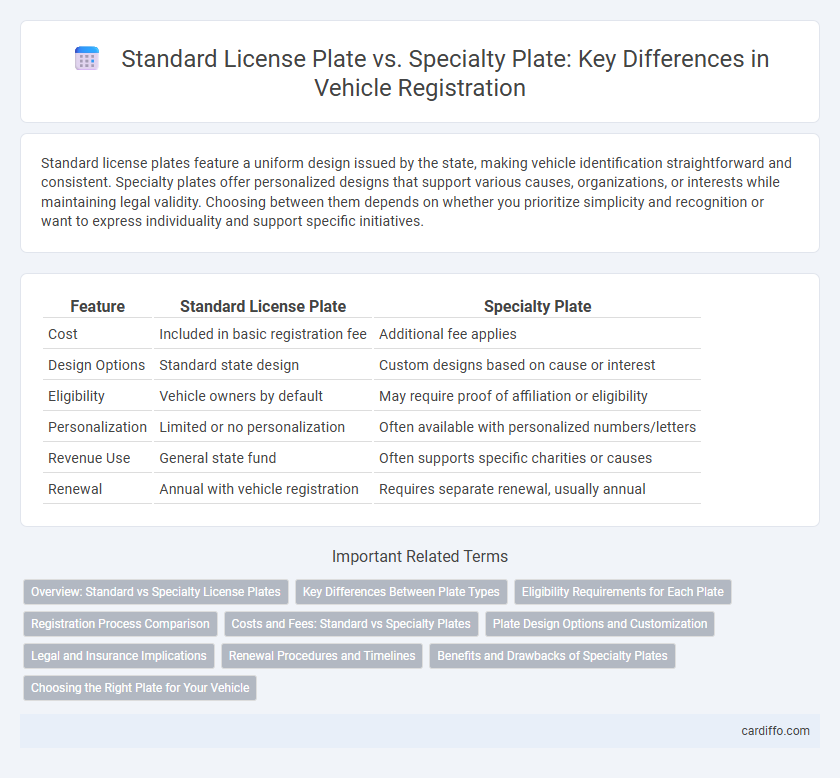Standard license plates feature a uniform design issued by the state, making vehicle identification straightforward and consistent. Specialty plates offer personalized designs that support various causes, organizations, or interests while maintaining legal validity. Choosing between them depends on whether you prioritize simplicity and recognition or want to express individuality and support specific initiatives.
Table of Comparison
| Feature | Standard License Plate | Specialty Plate |
|---|---|---|
| Cost | Included in basic registration fee | Additional fee applies |
| Design Options | Standard state design | Custom designs based on cause or interest |
| Eligibility | Vehicle owners by default | May require proof of affiliation or eligibility |
| Personalization | Limited or no personalization | Often available with personalized numbers/letters |
| Revenue Use | General state fund | Often supports specific charities or causes |
| Renewal | Annual with vehicle registration | Requires separate renewal, usually annual |
Overview: Standard vs Specialty License Plates
Standard license plates serve as the default vehicle identification issued by the state's department of motor vehicles, featuring a uniform design and plate number sequence for everyday use. Specialty license plates are customized options that often support causes, organizations, or hobbies, featuring unique graphics, colors, and lettering styles to reflect specific interests or affiliations. These specialty plates typically require an additional fee and may have distinct eligibility criteria compared to standard plates.
Key Differences Between Plate Types
Standard license plates feature a uniform design issued by state departments of motor vehicles and serve basic vehicle identification purposes. Specialty plates offer customized designs that support causes, organizations, or interests, often requiring an additional fee and sometimes eligibility criteria. These specialty plates provide opportunities for personalization and fundraising beyond the standard plate's regulatory function.
Eligibility Requirements for Each Plate
Standard license plates are typically available to all vehicle owners without specific restrictions, requiring only valid vehicle registration and proof of ownership. Specialty plates often have unique eligibility criteria, such as residency in a particular state, membership in certain organizations, or proof of affiliation with causes like veteran status or environmental initiatives. Applicants must meet these requirements and sometimes submit additional documentation or fees to obtain specialty plates.
Registration Process Comparison
The registration process for a standard license plate typically involves submitting basic vehicle information, proof of ownership, and payment of a standard fee to the Department of Motor Vehicles (DMV). Specialty plates require the same initial documentation but often include an additional application form and an extra fee to support specific causes or organizations. Processing times for specialty plates may be longer due to customization and approval requirements compared to the more straightforward issuance of standard plates.
Costs and Fees: Standard vs Specialty Plates
Standard license plates typically involve a one-time registration fee ranging from $20 to $40, with minimal annual renewal costs. Specialty plates, such as personalized or commemorative designs, often incur higher initial fees of $50 to $100, plus additional annual charges between $30 and $50 to support specific causes or organizations. These elevated costs reflect the extra administrative handling and funding purposes associated with specialty plate programs.
Plate Design Options and Customization
Standard license plates feature a uniform design with limited customization options, adhering to state-mandated color schemes and fonts for easy readability and law enforcement recognition. Specialty plates offer a wide array of designs, including themed graphics, colors, and personalized elements that reflect affiliations, causes, or personal interests while maintaining legal requirements. Customization on specialty plates allows vehicle owners to select unique backgrounds and often incorporate alphanumeric personalization, enhancing vehicle identity beyond standard issue visuals.
Legal and Insurance Implications
Standard license plates are typically linked directly to a vehicle's registration and are universally recognized by law enforcement, ensuring seamless legal compliance and straightforward insurance verification. Specialty plates, while offering personalized or cause-related designs, may require additional documentation to validate legal status and can sometimes influence insurance premiums depending on the plate's category and regional regulations. Insurance companies may assess specialty plates differently due to their association with specific vehicle types or uses, impacting coverage terms and liability considerations.
Renewal Procedures and Timelines
Standard license plates typically require annual renewal with a fixed deadline established by the issuing department of motor vehicles, often accompanied by a renewal notice sent 60 days prior to expiration. Specialty plates may have similar renewal timelines but sometimes involve additional fees and eligibility verification, which can extend processing time. Failure to renew within the specified period can result in late fees or loss of plate privileges, underscoring the importance of adhering to renewal schedules for both standard and specialty plates.
Benefits and Drawbacks of Specialty Plates
Specialty license plates offer personalized designs that promote causes or interests, providing vehicle owners with a unique identity and the ability to support specific organizations or charities. They often come with additional fees that can be higher than standard plates, which may deter some drivers due to increased costs and limited availability. While specialty plates enhance personalization and fundraising efforts, they can sometimes result in longer processing times and may not be accepted universally across all states or jurisdictions.
Choosing the Right Plate for Your Vehicle
Selecting the right license plate for your vehicle depends on personal preferences and regulatory requirements. Standard license plates offer a straightforward option with easy recognition and lower costs, while specialty plates provide customized designs that support causes, organizations, or personal interests. Consider factors like eligibility, fees, and the message you want your plate to convey when deciding between standard and specialty options.
Standard License Plate vs Specialty Plate Infographic

 cardiffo.com
cardiffo.com